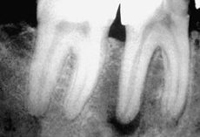Periodontitis
Periodontitis is a serious infection of the gums. It’s caused by bacteria that have been allowed to accumulate on your teeth and gums. As periodontitis progresses, your bones and teeth can be damaged. However, if periodontitis is treated early and proper oral hygiene is maintained, the damage can be stopped.
Periodontitis starts as inflammation and gets worse over time.
Inflammation (gingivitis)
Periodontitis begins with inflammation in the gums known as gingivitis. One of the first signs of gingivitis is that your gums will bleed when you brush or floss your teeth.
You might also notice some discoloration on your teeth. This is called plaque. Plaque is a buildup of bacteria and food debris on your teeth. Although bacteria are always present in your mouth, they only become harmful when conditions allow them to increase dramatically. This might happen if you don’t brush or floss, or get dental cleanings on a regular basis.
Early periodontal disease 
In the early stages of periodontitis, your gums recede, or pull away, from your teeth and small pockets form between gums and teeth. The pockets harbor harmful bacteria. Your immune system tries to fight the infection, and your gum tissue starts to recede. You’ll likely experience bleeding during brushing and flossing as well, and possibly some bone loss.
Moderate periodontal disease
If left to progress to moderate periodontal disease, you might experience bleeding and pain around the teeth and gum recession. Your teeth will begin to lose bone support and become loose. The infection can also lead to an inflammatory response throughout your body.
Advanced periodontal disease
In advanced disease, the connective tissue that holds your teeth in place begins to deteriorate. The gums, bones, and other tissue that support your teeth are destroyed. If you have advanced periodontitis, you might experience severe pain while chewing, severe bad breath, and a foul taste in your mouth. You’ll likely lose your teeth.
The symptoms depend on the stage of disease, but generally include:
- gums that bleed when you brush your teeth or floss
- bad breath
- changes in the position of your teeth or loose teeth
- receding gums
- red, tender, or swollen gums
- buildup of plaque or tartar on your teeth
- pain when chewing
- tooth loss
- foul taste in your mouth
- inflammatory response throughout your body
Symptoms in the early stages of periodontitis are often not very noticeable. Your dentist will likely be the first to point them out.
